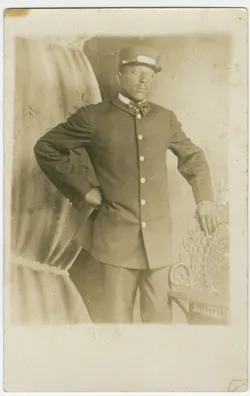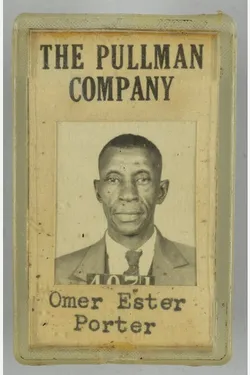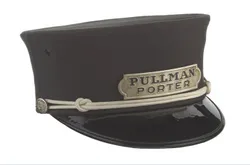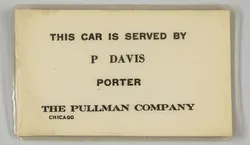
When Industrialist George Pullman[1] initiated his first “hotel on wheels” in the form of luxury overnight train cars in 1867, called Pullman Porters[2], his first employees were freedmen and the formerly enslaved. A time in history prior to concerns about safety and quality of work life, Pullman had a ready-made, endless supply of future employees willing to do anything to sustain themselves and their families. With a thriving manufacturing business of rail cars since 1864, his luxury sleeping cars, a totally new concept in personal travel, became an instant hit with wealthier passengers, revolutionizing personal travel, creating a rail monopoly, employing many and adding to his immense wealth.

These men and women redefined personal service and presented themselves as well groomed, well dressed and highly professional.[3] The duties of the porter included:
- Greeting and carrying passengers' luggage
- Maintaining sleeping berths
- Serving food and drinks brought from the dining car; and
- Providing all types of exceptional service to travelers.
Female Pullman workers, often referred to as Pullman Maids[4], were responsible for assisting female passengers and their children. Their duties included:
- Caring for children while mothers dined or rested; and
- Helping women with luggage, clothing repairs, and even providing manicure services.
These services were available night and day and always with a smile. It has been said that the porters often called the job, ironically, "miles of smiles[5]”.
Research your ancestors on MyHeritage
After Working HoursAfter Working Hours
Widely used on long-distance routes, Pullman’s luxury sleeper cars operated on numerous railroad lines in the United States. Each location had varying beliefs about the status of African Americans and thus created its own challenges for the Black Pullman employee. Unfortunately, they faced:
- Racial Discrimination: Due to the norms of the times, many porters were addressed in demeaning ways, echoing the remnants of slavery.
- Demanding Work Conditions: They worked grueling hours, often up to 400 hours a month, with shifts lasting 20 hours with minimal rest.
- Extremely Low Wages: Their income depended heavily on tips from passengers, many of whom still saw them as inferior, resulting in inconsistent and often insufficient compensation despite the level of service. From these meager wages they were also required to pay for their own uniforms and meals.
- Segregation and Harassment: During layovers in the Jim Crow South, porters faced segregation, harassment, and difficulty finding accommodations or meals.
George Pullman Creates Unrest Among Black and White EmployeesGeorge Pullman Creates Unrest Among Black and White Employees

In an effort to provide a controlling environment for loyal White employees Pullman purchased 4,000 acres, near Lake Calumet, 14 miles south of Chicago, on the Illinois Central Railroad. He built a community town adjacent to his factory. These mostly European employees were carpenters, draftsmen, seamstresses, engineers and other disciplines needed to design, manufacture and appoint not only his Pullman luxury cars but also his original rail cars.
Pullman’s planned community had lots of perks including housing, running water, gas lighting, trash pickup, street cleaning, shopping, churches, theaters, parks, a library, a hotel and man-made lake. The Hotel Florence, named for his daughter, was the only place in the planned community open to Blacks, but then only as waiters, cooks and maids.
In 1894 as the demand for rail service lessened, Pullman began to cut jobs and wages of his factory workers. Having promised guaranteed profits to his investors, he increased the working hours of those remaining in his plant but at lower wages. Being a company town, everything from housing, utilities, groceries and entertainment were paid to Pullman. Employees were dependent on Pullman who would not work with them to lower rents or prices in the company town. In May 1894, 4,000 workers went on strike eventually joining forces with the American Railroad Union (ARU)[6] and agreeing to exclude the Pullman Porters. Successfully disrupting the rail and freight business, a very connected Pullman gained the support of the President who sent in military troops, resulting in violence and death. In the end, both parties lost. Pullman never yielded, resulting in hundreds of thousands of dollars in spoiled or delayed freight. And workers never received any concessions.
Working Conditions for Pullman Porters & MaidsWorking Conditions for Pullman Porters & Maids

In 1925, under the leadership of A. Phillip Randolph[7], the Brotherhood of Sleeping Car Porters (BSCP)[8] was formed, the first predominately Black labor union in the U. S. By then, Pullman was the largest corporate employer of Blacks who numbered nearly 10,000. The union faced intense opposition from the Pullman Company, which used intimidation tactics, spies, and propaganda to suppress organizing efforts. Some Blacks were so afraid of losing their livelihood that they’d rather continue under the current conditions.
The BSCP was the first Black labor union to be affiliated with the American Federation of Labor (AFL)[9]. The BSCP fought to improve the working conditions and wages of Black railroad porters employed by the Pullman Company. Despite challenges, the BSCP persisted, and in 1937, it secured a collective bargaining agreement—the first between a major American corporation and a Black labor union. This victory not only improved wages and working conditions for porters but also demonstrated the power of organized labor in fighting racial discrimination.
Overall ContributionsOverall Contributions

Pullman Porters and Maids played a pivotal role in shaping American transportation and society. The jobs gave them status in the community and allowed them to share news of other communities by distributing their publications. They were among the first African Americans to gain access to stable employment and wages, which helped establish a Black middle class creating an important social impact.
See alsoSee also
Explore more about The Legacy Of The Pullman PorterExplore more about The Legacy Of The Pullman Porter
- Pullman Porters. History.com. Last updated January 24, 2025. Published February 11, 2019.
- Tye, Larry. Rising from the Rails: Pullman Porters and the Making of the Black Middle Class. New York: Henry Holt and Company, 2004.
- Asa Phillip Randolph Pullman Porter Museum
- Husband, Joseph. The Story of the Pullman Car. Chicago, A.C. McClurg & Co., 1917.
- Chicago's Pullman Porter Museum tells the story of African American, labor history. FOX 32 Chicago. Sept. 5, 2022q=pullman%20porters%20miles%20of%20smiles%20reviews&mid=D42E4C150B327F35A595D42E4C150B327F35A595&ajaxhist=0</nowiki>
- Anderson, C. F. Freemen yet slaves under "Abe" Lincoln's son; or, Service and wages of Pullman porters. Chicago, Press of the Enterprise printing house, c. 1904.
References
- ↑ George M. Pullman (U.S. National Park Service)
- ↑ https://www.historictrains.org/collection/philippe-9z32w
- ↑ https://www.smithsonianmag.com/smart-news/five-things-know-about-pullman-porters-180959663/
- ↑ https://www.wttw.com/chicago-stories/pullman-and-the-railroad-rebellion/often-overlooked-story-of-the-pullman-company-maids
- ↑ https://www.folkstreams.net/films/miles-of-smiles
- ↑ American Railway Union | Encyclopedia.com
- ↑ https://www.britannica.com/biography/A-Philip-Randolph
- ↑ Brotherhood of Sleeping Car Porters Union Formed - This Month in Business History - Research Guides at Library of Congress
- ↑ https://aflcio.org/about/history/labor-history-people/asa-philip-randolph

